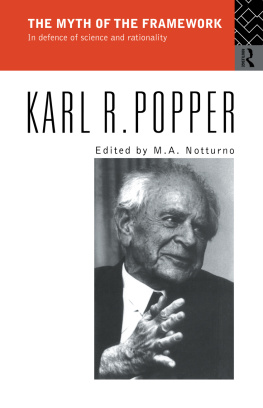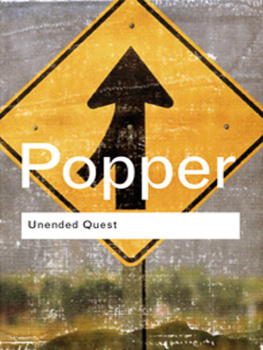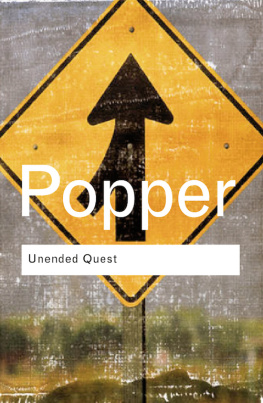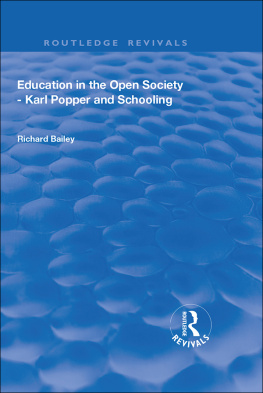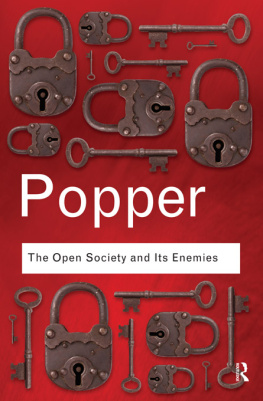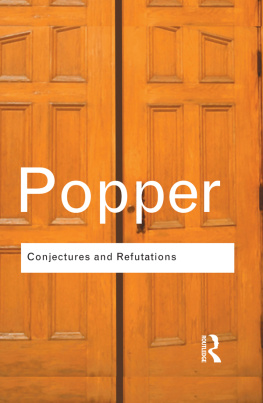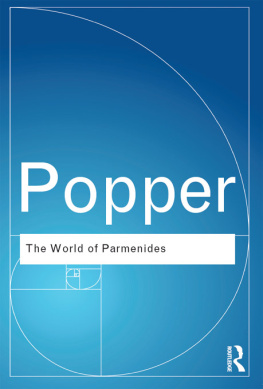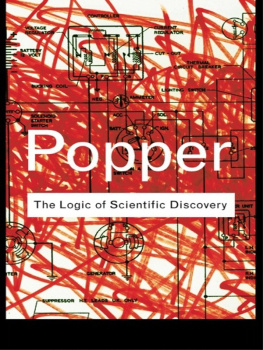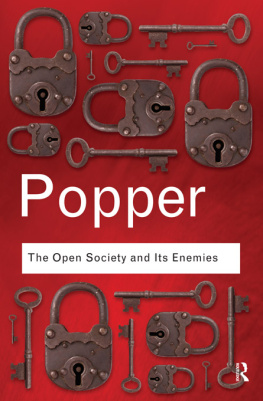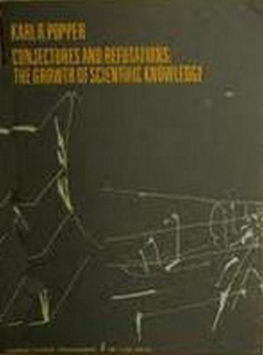Popper Karl - The Myth of the Framework
Here you can read online Popper Karl - The Myth of the Framework full text of the book (entire story) in english for free. Download pdf and epub, get meaning, cover and reviews about this ebook. year: 0, publisher: Taylor and Francis, genre: Romance novel. Description of the work, (preface) as well as reviews are available. Best literature library LitArk.com created for fans of good reading and offers a wide selection of genres:
Romance novel
Science fiction
Adventure
Detective
Science
History
Home and family
Prose
Art
Politics
Computer
Non-fiction
Religion
Business
Children
Humor
Choose a favorite category and find really read worthwhile books. Enjoy immersion in the world of imagination, feel the emotions of the characters or learn something new for yourself, make an fascinating discovery.
- Book:The Myth of the Framework
- Author:
- Publisher:Taylor and Francis
- Genre:
- Year:0
- Rating:5 / 5
- Favourites:Add to favourites
- Your mark:
- 100
- 1
- 2
- 3
- 4
- 5
The Myth of the Framework: summary, description and annotation
We offer to read an annotation, description, summary or preface (depends on what the author of the book "The Myth of the Framework" wrote himself). If you haven't found the necessary information about the book — write in the comments, we will try to find it.
The Myth of the Framework — read online for free the complete book (whole text) full work
Below is the text of the book, divided by pages. System saving the place of the last page read, allows you to conveniently read the book "The Myth of the Framework" online for free, without having to search again every time where you left off. Put a bookmark, and you can go to the page where you finished reading at any time.
Font size:
Interval:
Bookmark:

THE MYTH OF THE FRAMEWORK
THE MYTH OF THE FRAMEWORK
In defence of science and rationality
Karl R. Popper
Edited by
M.A. Notturno

First published 1994
by Routledge
2 Park Square, Milton Park, Abingdon, Oxon, OX14 4RN
Simultaneously published in the USA and Canada
by Routledge
270 Madison Ave, New York NY 10016
First published in paperback 1996 Reprinted 1997
Transferred to Digital Printing 2006
1994 Karl R. Popper, 1996 Estate of Sir Karl Popper
Typeset in 10/12pt Garamond by Solidus (Bristol) Limited
All rights reserved. No part of this book may be reprinted or reproduced or utilised in any form or by any electronic, mechanical, or other means, now known or hereafter invented, including photocopying and recording, or in any information storage or retrieval system, without permission in writing from the publishers.
British Library Cataloguing in Publication Data
A catalogue record for this book is available from the British Library
Library of Congress Cataloguing in Publication Data
A catalogue record for this book is available
ISBN 0-415-113202
ISBN 0-415-135559 (pbk)
Publishers Note
The publisher has gone to great lengths to ensure the quality of this reprint but points out that some imperfections in the original may be apparent
To Werner Baumgartner
CONTENTS
I do not regard myself as an expert in either science or philosophy. I have, however, tried hard all my life to understand something of the world we live in. Scientific knowledge, and the human rationality that produces it, are, I believe, always fallible, or subject to error. But they are, I believe, also the pride of mankind. For man is, so far as I know, the only thing in the universe that tries to understand what it is all about. May we continue to do so, and may we also be aware of the severe limitations of all our contributions.
For many years I have argued against intellectual fashions in the sciences, and even more against intellectual fashions in philosophy. The fashionable thinker is, in the main, a prisoner of his fashion, and I regard freedom, political freedom as well as a free and open mind, as one of the greatest, if not the greatest, value that our life can offer us.
Today it has become fashionable in the sciences to appeal to the specialized knowledge and authority of experts, and fashionable in philosophy to denigrate science and rationality. Oftentimes, this denigration of science and rationality is due to a mistaken theory of science and rationality a theory which speaks of science and rationality in terms of specializations, experts, and authority. But science and rationality have really very little to do with specialization and the appeal to expert authority. On the contrary, these intellectual fashions are actually an obstacle to both. For just as the fashionable thinker is a prisoner of his fashion, the expert is a prisoner of his specialization. And it is the freedom from intellectual fashions and specializations that makes science and rationality possible.
Today, the appeal to the authority of experts is sometimes excused by the immensity of our specialized knowledge. And it is sometimes defended by philosophical theories that speak of science and rationality in terms of specializations, experts, and authority. But in my view, the appeal to the authority of experts should be neither excused nor defended. It should, on the contrary, be recognized for what it is an intellectual fashion and it should be attacked by a frank acknowledgement of how little we know, and how much that little is due to people who have worked in many fields at the same time. And it should also be attacked by the recognition that the orthodoxy produced by intellectual fashions, specialization, and the appeal to authorities is the death of knowledge, and that the growth of knowledge depends entirely upon disagreement.
This is my excuse for collecting in a slim volume a few essays written in defence of science and rationality.
The essays in this volume were originally prepared on different occasions as lectures for non-specialist audiences. As a result, they often contained a rsum of my general approach to philosophy, and they sometimes contained brief discussions of some point taken up at greater length in another essay. This posed something of a problem when bringing them together in this volume. I have attempted to solve it by eliminating passages where there was an obvious overlap between two essays (provided this could be done without inflicting too much damage on their structure).
Some of what is said in these essays will undoubtedly be familiar to those who know my other works. But I believe that there is also much in these essays that will not be so familiar. And I have, in any event, tried hard to make every point and every argument as simple and as clear as I could.
This volume is permeated by a conviction which I have tried to indicate by its subtitle, and which has inspired my writings for at least the last sixty years. It is the conviction that scientific knowledge is, despite its fallibility, one of the greatest achievements of human rationality and that we can, through the free use of our always fallible reason, nonetheless understand something about the world and, perhaps, even change it for the better.
K.R.P.
Kenley, Surrey, 1993
The idea of compiling this volume from my papers acquired in 1986 by the Hoover Institution at Stanford University, California, is due to my friend Dr Werner Baumgartner, a biochemist wishing to make my outlook known among American scientists. But he also took the initiative and kept it, carrying out his idea step by step. He obtained the financial help of the Ianus Foundation and engaged the scholarly help of Dr Mark Notturno, who in the later stages was assisted by his wife Kira. They enthusiastically worked on the task of selecting and editing these essays and lectures. I am deeply indebted to all who were concerned in the production of this volume.
K.R.P.
Kenley, Surrey, 17 March 1994
All, or almost all, the papers collected in this volume are written to defend rationality and rational criticism. It is a way of thinking, and even a way of living: a readiness to listen to critical arguments, to search for ones own mistakes, and to learn from them. It is, fundamentally, an attitude that I have tried to formulate (perhaps first in 1932) in the following two lines:
I may be wrong and you may be right,
and by an effort, we may get nearer to the truth.
These two lines in italics here quoted were first printed in 1945 in my Open Society (volume II, the second page of chapter 24, The Revolt Against Reason); and I italicized the lines in order to indicate that I regarded them as important. For these two lines were an attempt to summarize a very central part of my moral articles of faith. The view that they summed up I called critical rationalism.
But the critics of my Open Society and of critical rationalism were, it seemed, blind to these two lines: so far as I know, none of my critics showed any interest in them, or quoted them. Some said that my book lacked any moral principle or ethical reasoning, others that my critical rationalism was dogmatic too dogmatic; and there also was an attempt to replace my critical rationalism by a more radically critical and more explicitly defined position. But because this attempt bore the character of a definition, it led to endless philosophical arguments about its adequacy. I never found anyone who had taken notice of the two lines that I had intended as my moral
Next pageFont size:
Interval:
Bookmark:
Similar books «The Myth of the Framework»
Look at similar books to The Myth of the Framework. We have selected literature similar in name and meaning in the hope of providing readers with more options to find new, interesting, not yet read works.
Discussion, reviews of the book The Myth of the Framework and just readers' own opinions. Leave your comments, write what you think about the work, its meaning or the main characters. Specify what exactly you liked and what you didn't like, and why you think so.

